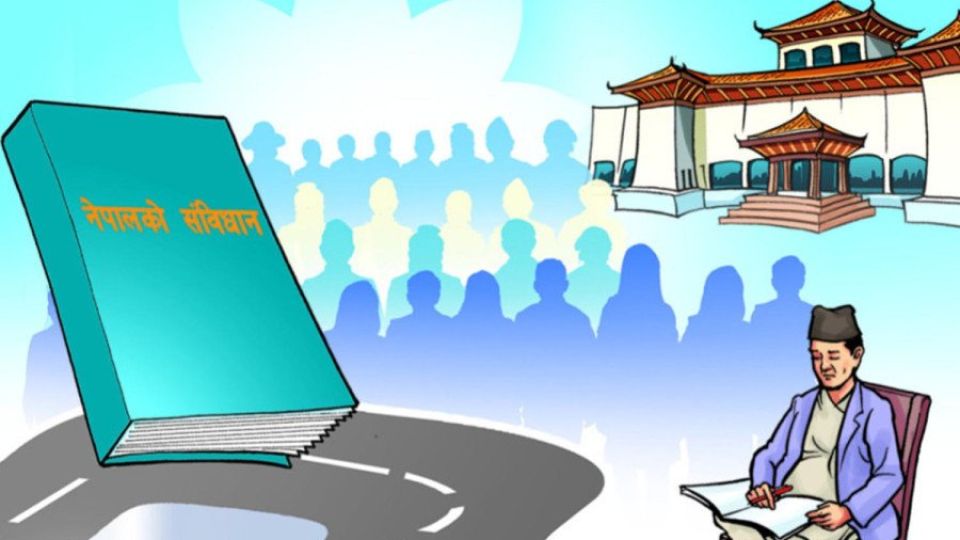December 26, 2024
KATHMANDU – Five months after forming the government led by KP Sharma Oli, coalition partners Nepali Congress and CPN-UML are in the final stages of forming mechanisms to identify the areas for amending the constitution.
A major agreement between the Congress and the UML while forming the government in mid-July was to amend the constitution and review provisions that have created difficulties in its implementation.
On Tuesday, the constitution amendment process finally entered bilateral talks between the Congress and the UML. An eight-member task force formed to strengthen the relations between the two parties met on Tuesday and discussed initiating the amendment process.
“The issue of amendment has finally entered our discussion from today [Tuesday],” a task force member said. “We are currently discussing how to proceed and start wider discussions and consultations. We are considering forming either a political or a non-political taskforce to do the required homework.”
The cross-party task force will be led by a senior politician, and comprise members of different political parties. If a non-political task force is formed, it will be led by a former chief justice of the Supreme Court or any other respected legal figure acceptable to all stakeholders.
Some Congress and UML leaders have suggested forming a non-political mechanism or taskforce where legal experts, constitutional experts, human rights activists among others can be accommodated and a way ahead can be found as per their suggestions, according to a taskforce member. “We will confront difficult questions if we form a political mechanism,” he said.
The meeting lasted three hours and leaders also discussed some ‘neutral’ names who can potentially lead such a mechanism or taskforce.
Some political parties in the opposition have already started discussion and deliberations on the issues that need to to be addressed in order to amend the constitution.
Point number two of the seven-point agreement signed between the Congress and UML in July stated that the national consensus government under the leadership of Oli would give priority to making necessary amendments to the constitution and formulating laws that ensure political stability by evaluating the strengths and weaknesses as well as the complexities seen in its implementation.
“As per the understanding, our party will soon form a mechanism to identify the content for amendment,” said Home Minister Ramesh Lekhak.
The Nepali Congress and the UML will soon form separate task forces to identify the contents for amendment in the constitution, Lekhak said at an event in Kathmandu. “The government has also taken an initiative on this.”
“The amendment process does not end overnight. It will happen after a series of discussion and deliberations among the parties. We will assess our decade-long experience of constitutional practice and, accordingly, all political parties will sit together and make amendments,” he said.
“We will initiate discussions, evaluate and assess the status of the implementation of the constitution, identify the amendment subject matters, and proceed with discussions and deliberations,” said Lekhak.
The agreement between the two largest parties to amend the constitution has ignited debate in and outside political circles. Parties are divided on whether this is the right time to make changes in the constitution.
But Home Minister Lekhak said the ruling and opposition parties will first review the 10-year journey of the constitution and identify its strengths and weaknesses. Second, the two ruling parties will identify the issues that need to be amended and the ruling and opposition parties will sit together for this. At last, the Congress and UML will reach an agreement on the content for amendment and table it in the house.
He also clarified that the amendment to the constitution will strengthen inclusiveness rather than weaken it.
The third largest party, the CPN (Maoist Centre), will also soon publicise its position on constitution amendment. The upcoming central committee meeting of the party scheduled to kick off on January 5 will open discussions on the matter, said party spokesperson Agni Prasad Sapkota.
“The party has its own position on the amendment but we are open to discussions,” Sapkota said. The party will make its position public only after the meeting of its central committee.
“Our position is clear: any amendment to the constitution should be for a progressive cause, not for a regressive cause. It should aim at development and prosperity. Second, there should be a directly elected president for political stability. We must opt for full inclusiveness in both houses of parliament. If we guarantee these issues in the new amendment proposal, the protracted political instability in the country will come to an end,” said Sapkota.
Besides the Maoist Centre, other political parties represented in parliament are also doing homework regarding the amendment in the constitution but they are yet to make their position, preparation and homework public.
Another party, the CPN (Unified Socialist), on December 17 formed a seven-member task force under party leader Prakash Jwala to work out the party’s position on the constitution amendment process. “We have formed a task force which will come out with some recommendations in this aspect,” said party spokesperson, Jagannath Khatiwada.
Congress General Secretary Gagan Thapa, speaking at a party function in Kathmandu on Sunday, also said a mechanism to amend the constitution would be formed within a few days. Thapa added that the mechanism would be pragmatic and amendments would be made cautiously.
“The debate on amending the constitution has begun,” Thapa said. “Within a few days, the Congress and the UML will form a mechanism. We will handle this cautiously since there is no room for adventures. We will also have a dialogue with other political parties.”
He said the constitution cannot be amended just because the Congress and the UML want it. It will be done only after broad consultations among the Maoist, Madhesi and other political forces.
“After reaching an agreement with all parties and stakeholders, we will amend minimum provisions necessary to ensure the constitution’s smooth functioning,” Thapa said.


